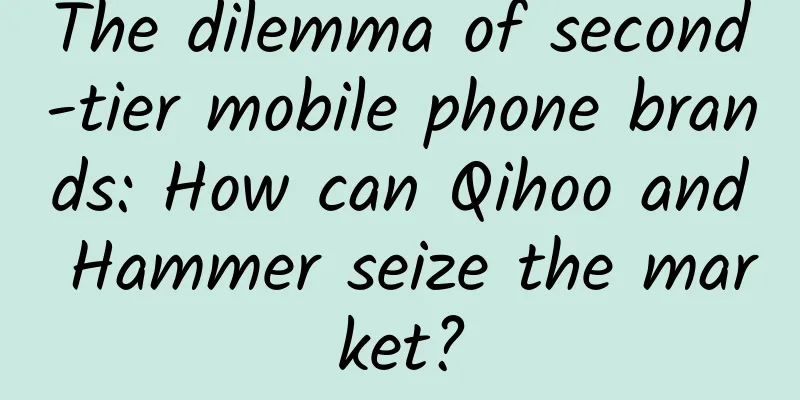The dilemma of second-tier mobile phone brands: How can Qihoo and Hammer seize the market?

|
One is the Nut phone from Luo Yonghao, who is known as the "crosstalk actor", and the other is the Qihoo phone from Zhou Hongyi, who is known as the "Fighting Buddha". They have attracted countless attention in the past two days. But after the excitement, they are facing the fierce competition in the red ocean of China's smartphone market. How can these newly emerging second-tier Internet mobile phone brands survive? At present, the first wave of dividends in China's smartphone market has ended. The race to grab land, led by international brands such as Apple and Samsung, and domestic brands such as Huawei, Xiaomi, Lenovo, ZTE, and vivo, has basically been completed. In addition to the first-tier brands, there are many domestic mobile phone brands such as Meizu, OnePlus, LeTV, Smartisan, Qihoo, ZUK, and Gionee that are competing for the limited market share. What is even more dangerous is that a report by market research firm IDC shows that in the first quarter of this year, China's smartphone market experienced its first quarterly year-on-year decline in shipments in six years; and Gartner's latest statistical report also shows that in the second quarter of this year, global smartphone sales increased by 13.5%, while Chinese smartphone sales decreased by 4%. More players are facing a smaller market capacity. The question left for everyone is whether the mobile phone market will accelerate the reshuffle and become more concentrated in the future, or will it become more differentiated due to full competition? "The optimistic phenomenon is that compared to the era of feature phones, the current mobile phone market is actually highly fragmented. In addition to Apple, Samsung, Huawei, Xiaomi and other players, there are many other players, and the market share of each company is very close." Qian Chen, CTO of Smartisan Technology, told Tencent Technology. The pessimistic side is that the smartphone market has yet to see what the next trend will be, and for small players, the chances of breaking through the existing market structure are slim. Xiaomi's sudden rise was due to catching up with the mobile Internet trend and the trend of switching from non-smartphones to smartphones. It was hard not to succeed if it followed the trend. "Standing on the vent of the wind, even a pig can fly." This is the way to success as described by Lei Jun. For new challengers, the boom period has passed, and targeting a niche market through a specific function or selling point has become the best weapon for second-tier Internet brand mobile phones. "If you use the traditional approach and imitate Xiaomi, Meizu, or Huawei, you basically have no chance. But whether it is product innovation or technological innovation, I think the mobile phone industry still has opportunities." Zhou Hongyi, chairman of 360, said in an interview with Tencent Technology yesterday. Focus on specific functions and market segments Take the Qiku mobile phone released yesterday for example. The selling point of the mobile phone that Zhou Hongyi spent 238 days to build is "security", which is his strength. He believes that people may not buy mobile phones for safety, but he wants to make a mobile phone that will not lose money. He even guaranteed every user on the spot that if users of Qiku mobile phones are cheated due to technical security issues, Qiku property insurance will pay 120,000 yuan. Although mobile phone security is a major criticism of the industry, especially the rampant malicious programs on Android, security is not the top priority in the actual willingness of users to buy mobile phones. According to a study conducted by an overseas agency last year, users said that they do not need fancy mobile phone features, but instead they just want their phones to last longer. 89.2% of people said that long battery life makes them more willing to buy smartphones, which is the most important influence. Similarly, a research report from Penguin Intelligence in June this year showed that among the survey samples of more than 10,000 users, users do not like cheap mobile phones with bad experience. In contrast, they are more willing to spend a certain amount of money to enjoy higher-configuration devices. In the survey, 32.3% of users are willing to pay for high-configuration mobile phones, which is 2.6 times the number of users who are unwilling to pay. As for the willingness to purchase, users are most willing to pay for improved battery life. It makes sense that battery life is the most important to consumers, because smartphone users now spend most of their time on their phones. A survey shows that Chinese people spend more than 3 hours a day looking at their smartphones, so battery life is the most important factor for users when buying a phone. In contrast, Huawei, Zhou Hongyi's favorite mobile phone brand and his future benchmark, has only achieved some success after four years. This was not due to the competition for a certain function, but the improvement of overall quality, especially the high investment in R&D and innovation. "Our R&D investment is many times that of our domestic counterparts, and it is mainly investment in innovation," Huawei Terminal Chairman Yu Chengdong previously told Tencent Technology. In addition to Qihoo, LeTV, OnePlus and other manufacturers have their own unique positioning. For example, LeTV focuses on the ecological concept, and OnePlus has made early arrangements for overseas markets. It can be foreseen that after the Chinese market is saturated, foreign market segments such as Brazil and India will also become the focus of domestic mobile phone business expansion in the future. Facing a major test for channels and supply chains The times have changed. After the glorious period of e-commerce, Internet mobile phone brands have been criticized by consumers for not being able to meet user needs in terms of product experience in the competition with traditional mobile phone brands. "No matter how good it is, I still dare not buy it if I can't touch it." In the minds of many consumers, the experience of mobile phones is crucial to consumer behavior. For Internet mobile phone brands, the biggest challenge to survival is the ability to operate channels and control the supply chain. The sales volume of Hammer smartphones has always been a focus of attention, because for traditional smartphone brands that emphasize high configuration and high cost performance, everyone wants to know how long the Internet strategy based on sentiment can last. At the Nut brand launch conference, Luo Yonghao finally confessed the results that were not as good as expected. The first generation of Hammer smartphones sold only 255,000 units in 14 months, an average of less than 20,000 units per month. In addition to product positioning and brand recognition itself, the problem behind this is the lack of experience in channel operation. Many people think that Xiaomi is a typical Internet phone, but in fact, many Xiaomi phones are sold through offline channels. Hammer has no offline channels and relies entirely on Weibo and official website pre-orders. The result is predictable. Data released by GFK showed that in the fourth quarter of 2014, sales of domestic mobile phones in online channels reached 25 million units, while in the first quarter of 2015 it was only 19 million units, a month-on-month decrease of 22.6%. Actual sales in offline channels increased from 76 million units to 77 million units. "Unlike Smartisan T1, Nut started discussing many issues such as design, production capacity, and distribution with ODM partners and channel parties at the beginning of the project." Qian Chen, CTO of Smartisan Technology, told Tencent Technology. Not only Hammer phones, but also LeTV phones had unsatisfactory sales in the early stage. According to an insider who revealed to Tencent Technology, LeTV phones’ initial problems were mainly in the supply chain, because LeTV announced that the Bom list was priced according to mass production costs, which caused strong dissatisfaction among competitors and supply chain manufacturers, thus affecting the final supply. Secondly, LeTV also lacked control over channels. In the early stage, mobile phones were only sold online. If it had not quickly expanded offline channels, it would have taken more than three months to break through the sales of 1 million units. Regarding the inventory of Qihoo phones, Zhou Hongyi admitted in an interview with the media, "There is no problem with the Youth Edition at present, but due to the process requirements of the VIP and Ultimate Editions, we are still speeding up the solution." It should be noted that LeTV has invested in Coolpad and become the second largest shareholder, and has also indirectly become a shareholder of Qihoo. It is conceivable that the three parties will compete with each other in the supply chain. According to Tencent Technology, Qiku will expand offline channels in addition to online sales. "We are now considering establishing our own offline channels, and offline and online channels are fully interactive," Zhou Hongyi said. It is reported that Qiku has contacted D Phone, the largest mobile phone chain in China. In order to enhance the ability of channel operation, Zhou Hongyi also secretly hired former executives of well-known mobile phone brands in the industry as consultants. Limited market space In the first half of 2015, the competition in China's mobile phone market became increasingly fierce, and manufacturers were under greater product and market pressures. A large number of facts are proving that the most glorious moment of the mobile phone market has passed. Data shows that from January to June 2015, a total of 761 million mobile phones were produced in the Chinese mobile phone market, a year-on-year decrease of 4.55%. Overall, the original demand in the mobile phone market has gradually become saturated, and the main reason for the market growth is the user's demand for upgrading. In terms of market share, Apple, Samsung, "China Mi Lian Mei", vivo, OPPO, etc. have divided up more than 90% of the domestic market. From the perspective of price competition, Xiaomi still dominates the domestic market below RMB 1,000, while Huawei, vivo, OPPO, and Meizu perform outstandingly in mid-range products. In the high-end segment, Apple and Samsung still have obvious advantages, and the gap between Huawei and them is narrowing. The July data released by GFK showed that in the 1,000-1,500 yuan price range, Huawei's Honor brand accounted for 16%, mainly due to the outstanding performance of models such as Huawei Honor 4C and Honor 6; in the 1,500-2,000 yuan segment, vivo accounted for 16.8% of the share, and the Huawei Mate 7 was mainly responsible for models above 3,000 yuan. In summary, the saturated market and relatively stable structure have left very little room for Internet brand mobile phones to survive. Regarding the Internet companies that have entered the mobile phone field in the past six months, Yu Chengdong believes that a large number of them will fail. He believes that in the next three to five years, most mobile terminal manufacturers will disappear. |
<<: WeChat announces eight hardware industry solutions for the first time
>>: Wearable devices may promote the integration of wireless technology
Recommend
How should operations be performed in the three stages of APP development?
The bell of 2017 has rung. As I am about to enter...
You have these bad habits, no wonder you can't resist aging! See how many of them you have
Is there any kind Faster than Su Bingtian? some F...
Interpreting the marketing logic of video platforms
At the 9th Internet Audiovisual Conference, "...
April Fools' Day poster collection: Baidu and Tencent show off their black technology
April is probably the most ridiculous month. You ...
Summary of new media marketing hot spots and wonderful cases in May
Brand promotion can greatly increase exposure by ...
New App Store: From search ranking to download conversion, you need these three yardsticks
It’s the middle of the year again, and it’s time ...
How much does it cost to attract investment for the Haikou Mechanical Equipment Mini Program?
Haikou Machinery Equipment Mini Program investmen...
The cooperation with Huawei has been postponed again. Is Changan Automobile also caught in the question of "technology or soul"?
What is it like to work with Huawei? In 2021, Che...
GSMA: 5G's contribution to the global economy could reach $2.2 trillion by 2034
GSMA predicts that 5G will contribute $2.2 trilli...
How to promote the brand?
The biggest difference between a brand and a prod...
Where is New Horizons? Does it also carry the coordinates of the Earth? Will it attract alien abduction?
Many people have been exclaiming that we should n...
Want to become a high-level SEM promotion and marketing expert? You must go through these 5 stages
The author divides bidders into 5 levels: 1. Novi...
Offline traffic generation skills, a set of effective solutions!
As an offline merchant, what methods have you tri...
Samsung monopolizes Snapdragon 835, LG G6 is forced to polish 821 processor
It has been rumored for a long time that Samsung ...
New research shows that Tyrannosaurus Rex may have a small "air conditioner" in its head
Every summer, I have to sigh that air conditionin...









